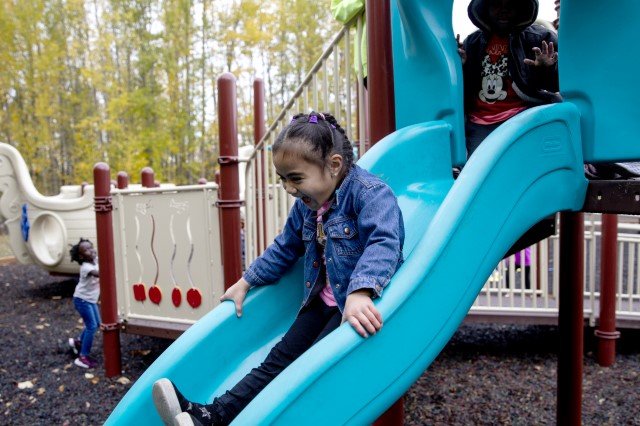ASD Builds Higher Quality Classrooms With Pre-School Mental Health Support
Anchorage School District’s youngest students will benefit from the expansion of an innovative approach to supporting pre-school classrooms and families, thanks to Alcohol Tax Program dollars.
Early childhood, from birth to age 8, is the most important developmental phase of life, a time during which social relationships and learning opportunities have an enormous impact on a child’s future. In 2019, Anchorage School District launched an innovative Early Childhood Mental Health Consultation program to serve preschool-aged children (ages 3-5) to promote healthy social and emotional development of young children in Title 1 school classrooms through collaborative relationships. Early childhood mental health consultation is an evidence-informed, multi-level intervention in which mental health professionals team with people who care for young children.
When the pandemic hit in 2020, the educational landscape was drastically changed for the next three years, impacting students and families in ways that are still playing out at home and in the classroom. Pre-school aged children, for example, were born just before or during the pandemic. Families navigated work challenges alongside the responsibilities of caring for children at home.
“Children entering pre-school now may be experiencing a dramatic shift from individual screen time at home to navigating the classroom with a room full of students. Parents were under an enormous amount of stress, and children experienced this before coming to school,” says Rachel Boudreau, the program’s mental health consultant.
How Early Childhood Mental Health Consultation Works
The mental health consultation model is a multi-level approach that supports teachers, paraprofessionals, families and children. The first level of support a mental health consultant provides is to observe in the classroom setting and provide their perspective to teachers. By getting to know the teacher and their style of teaching during the classroom visits, the consultant understands how to support the teacher and can help build their capacity to support children who demonstrate challenging behaviors.
Consultants support by working alongside the early childhood professionals in their daily settings, sharing strategies, modeling evidence-based intervention approaches, facilitating referrals, and cultivating a deeper understanding of the factors that shape young children’s social-emotional development. Consultants take a strengths-based approach to their work with providers and to their conceptualizations of children’s behavior. Furthermore, consultants consider and intervene at multiple levels, including the classroom, family, and the wider community, to understand the contextual and cultural factors impacting young children’s behavior.
According to Jessica Nesset, ASD Director of Early Learning programming, this approach is already helping teachers, students and families.
“It is such a benefit to promote healthy social and emotional development in pre-school to support self-regulation: how to take a breath, how to disagree, how to play collaboratively. Pandemic kids may not have had that experience or opportunities to learn these skills.”
Stronger Support for Teachers, Better Outcomes for Kids and Families
When teachers don’t have specific tools to address special needs in the classroom, they may begin to experience burnout. The sweep can be broad at times, but as a mental health consultant, Rachel can come into the classroom and find ways to support everyone in their role, adding a lens that was not there before this model was adopted. Consultants provide positive feedback to build on a teacher’s strengths. Sometimes just hearing “great job!” is the reinforcement a teacher needs when trying a new approach in the classroom.
Consultants develop relationships with teachers so that they in turn can better develop relationships with parents and students. The goal is to increase classroom capacity, which helps to prevent teacher burnout.
“We need more of this at all levels in schools, but it is especially necessary at the pre-school level,” says Rachel. After an observation, she can give feedback for individuals and for the group as a whole that will lead to more productive conversations with families.
In the past, teachers may have relied on school counselors to support behavior interventions or to engage with families, but they aren’t licensed to support mental health, especially at the pre-school level. The multi-level relationship model builds a stronger support system that increases teacher confidence and connects parents to the classroom. Connections with students and families paired with the model’s structure make it possible to meet the kids where they are at so that teachers and the mental health consultant can provide the right support.
Building a Sense of Belonging and Community
Anchorage School District’s early education program offers community events that help ease children and families into the pre-school learning environment. A monthly Countdown to Kindergarten and a five-week Play-To-Learn group cohort that meets twice a week provides families with an opportunity to bring their kids to a pre-school setting to interact with teachers.
“We see higher quality classrooms when we have mental health consultation. We see teachers that are less stressed, environments that are warm and welcoming, drop-offs with more parent-teacher and parent-parent connections and more opportunities to reinforce positive behaviors. It’s a better community and a more nurturing environment,” says Rachel.
Alcohol Tax Funds at Work
Anchorage School District’s pre-school program has grown significantly in the past four years to improve kindergarten readiness for more families. With the growth in families served, the district sees more need for mental health consultation services and support for teachers that will improve retention and recruitment. Alcohol tax program funds will provide eight teacher positions, eight paraprofessionals (teachers’ assistants), an instructional coach and three mental health professionals for Title 1 schools in the district.
Longevity of this programming is very important. Because of the mental health consultation model, there are teachers who are now able to be self-sustaining year-over-year. Rachel is seeing teachers with increased capacity. There is confidence among educators who feel their concerns are heard and that they will get the support they need because of the relationships that have been built. Teachers see what works, build on their skills and abilities and the classroom becomes a community.
Rachel is excited to see this program grow.

